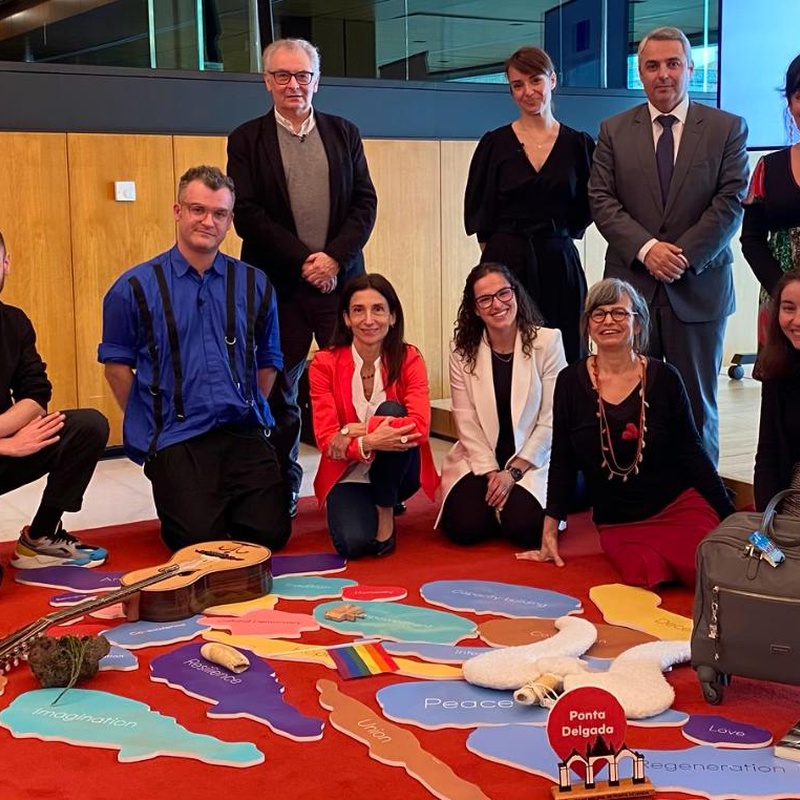
Ponta Delgada City Council presents “Hand in Hand” project in February
In the scope of Ponta Delgada| Azores Candidacy - for the European Capital of Culture (Azores 2027), the Ponta Delgada City Council will present the “Hand in Hand – The Power to Inspire" project in two webinars, to be held on 3rd and 8th February, both starting at 14.00, via the following links:
https://zoom.us/j/95730211548?pwd=bDJEN05PZEFiNDRvK2lxTUIxRC9SUT09 and
https://zoom.us/j/94762364040?pwd=cTlVY0VBY0ZRc3FsY0RxSlhwRVVMUT09.
This is a project for creating and strengthening communities, opening the door for leaders, coordinators, animators, artists, educators and activists to take responsibility into their hands and create their own initiatives that promote decentralisation, the enhancement of our stories and also equal access of different audiences to Culture.
It is an open call, under the Azores 2027 candidacy, in partnership with CRESAÇOR - Cooperativa de Economia Solidária (cooperative), which will support nine projects carried out in the Azores and promoted by agents in the Region. This pilot programme supports activities and projects that promote cooperation and collaboration between islands and municipalities; approximation between different generations; inclusion, active participation and/or empowerment of different communities; the relation between Culture with well-being, Nature and Sustainability; new ways of telling Azorean stories to Europe and the World.
The project was created to meet some of those needs, aiming to boost the intersection of Culture with other areas of society, particularly by sharing resources.
The first webinar
On February 3rd Ana Silva, Technical Director of Cresaçor, will present the projects Communitarian Herbarium of the Azores - Bruno Márquez; Picnic on the Battlefield - Sara Santos; Compass - Joel Fernandes; Network of Memories - Vânia Chagas; The Sea of “Saudade” (a deep emotional state of melancholic longing for a person or thing that is absent) - Frederico O`Neill (in place of Pedro Bautista).
The project “Communitarian Herbarium of the Azores” improved the knowledge of the native and endemic flora of the Azores, as a means of accessing and disseminating the archipelago's natural heritage. The Communitarian Herbarium was the result of the work of Bruno Márquez and of the Portuguese Society for the Study of Birds (SPEA), carried out through fieldwork and collection of specimens, as a way of building knowledge from one's own experience and relationship with the territory.
"Picnic on the Battlefield", by the Spanish writer and filmmaker Fernando Arrabal, is the first play written by the author. It is a precise, critical writing that dispels the absurdity of war, with a surprising and bitter irony. After so many decades, the work describes a still current issue – the trivialisation of life and death continues to happen on the streets, in the world and next to us, which proves the talent of the author. The group's activity focuses on the community where it is located – the island. Both the island and the group are deeply marked by external openness. Furthermore, this connection is the mark of a conscious and critical culture in a global world.
The "Compass" project is related to the object itself which, together with the help of the compass rose displayed inside, was especially known at the time of the Discoveries as an innovative navigation instrument for finding direction and location. The project’s aim would be to place on each Azorean Island, at strategic locations in public areas facing the ocean, an informative and interactive compass on the pavement that would communicate territorially with other islands’ compasses or with other geographical points that have had or have a relationship with the Azores. Each island’s compass would feature a different graphic with information on neighbouring islands and on other points of the globe. The public would walk freely on the interactive compass, in a didactic way.
The project "Network of Memories" was born out of the will to preserve the stories of Azorean women – the fine threads of a movement that is both daily and secular –, so that later, in a spirit of sharing, one can find a piece of what our island and our archipelago is. This first approach of the project focuses on Corvo and Flores islands – in this West, which is the beginning rather than the end of a territory that is as much Atlantic as European. The voluntary testimonies were recorded and photographed. All the collected material is shared here, as a sort of “receptacle” of experiences, therefore creating a real network of memories (https://rededememorias.wordpress.com/).
As for " The Sea of Saudade", this is a theatre project that was born from the union of two Macaronesian theatre companies: on one side, Teatro Vice-Versa from São Miguel Island and on the other side Teatro Bolo de Caco from Funchal, Madeira Island. Both became partners for the candidacies of the Azores and Madeira 2027 for the European Capital of Culture and are developing different projects, trying to get to know and to take advantage of each other’s capabilities and strengths, proving that, despite the kilometres of distance between our islands, there are many more synergies, empathies and similarities than things that differentiate us.
The second webinar
On February 8th, Henrique Constância presents "Vira, Mozart! (“Vira” is a Portuguese folk dance and music), a project that intends to exchange experiences between people who share the taste for music, harmoniously integrating classical and traditional folk music, particularly from S. Miguel Island. Mankes Piano Quartet, a musical group from Amsterdam, will play classical music, namely Mozart’s musical pieces that have many folk music features in common. This international group will promote musical workshops and come to meet traditional music groups of two communities in São Miguel Island’s municipalities: Folklore Group "O Grujola" from Lagoa and Castanholas (castanets) Group from Ribeira Grande, Rabo de Peixe. For one day, the participating groups will socialise and rehearse together with the visiting musicians, having the opportunity to present their music and to have a close contact with musical genres which are not part of their daily life. All participants will perform a traditional piece taught by the local group followed by the performance of a Mozart piece, where local group members will be invited to improvise and "imitate". The elements of the groups should present their musical instruments, highlighting technical aspects of the execution, and emphasising the specific techniques of traditional instruments. This day of sharing will end with a concert open to the whole community (without a stage), where all participants will be involved in the place where music will be performed, creating an intimate experience with sounds and performers.
Luís Senra’ s "Reconnective Nature" is a social intervention in the music field, using nature as a starting point to work awareness and attention for what is around and within us.
The development of these activities allowed the involved parties to rediscover awareness about nature, the way it is perceived, its importance and also how to use it to learn to manage emotions, to reflect on life, society and education, to listen, to speak, to give space to others, respecting them, and to be creative and imaginative, where nature becomes a driving force of the inner child and the deconstruction of idealisations imposed by society which often lead to isolation or exclusion.
Among all the discoveries, the most important one is that Nature is enough to bring us back to ourselves and that the process of each one of us is valid and important in itself. Thus, there is no place for right or wrong, but only for personal evolution, with creativity, imagination and honesty (https://natureza-reconectiva0.webnode.pt/fbclid=IwAR3VsYMaenRPMVCazJUisFbdx1Ptg5n0l0YKvxH_Mw6UpY7VyHkIEyml0tQ).
The project "Returning the Root to the Square” is an innovative proposal in the olfactory-gastronomic field (smell and taste) developed by Cláudia Camacho, the first independent woman perfumer in Portugal, and by Nuno Miguel Dias, a gastronomic anthropologist who writes gastronomic articles for Vogue magazine.
Nuno Malato presents "Counter Postcard", in which he proposes to develop the edition of a "counterpostcard", in an act of critical and constructive counterpoint of conscience. Using the impact of synthesis images, he intends to deepen themes and interconnected domains that represent the complex archipelagic territory of the Azores, in a rediscovery and contemporary development perspective, where the past and the future are crucially linked. "Counterpostcard" is naturally targeted at the archipelago’s visitors but it will inevitably catch the inhabitants’ eye, even if they have limited access to it in terms of quantity.


